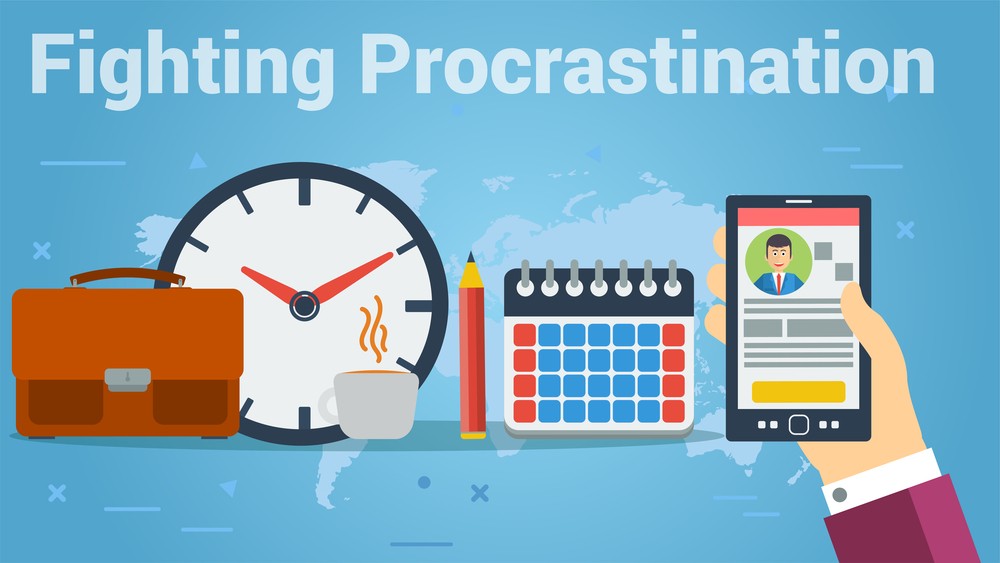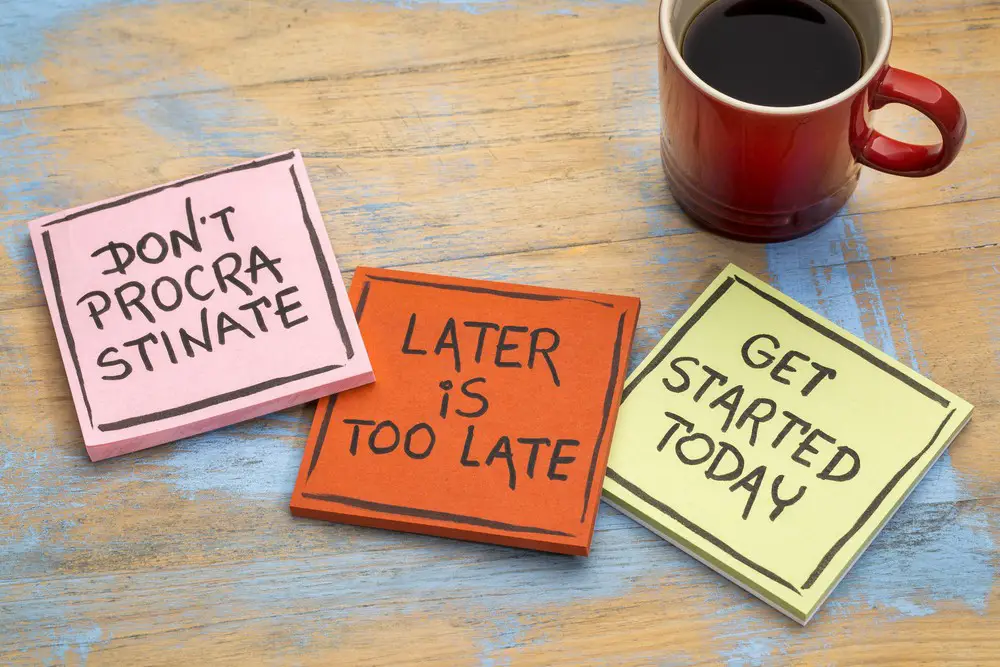As a BetterHelp affiliate, we receive compensation from BetterHelp if you purchase products or services through the links provided
Often, procrastinating is an unconscious behavior that a lot of people are not even aware of. If you continually find yourself putting things off until the very last minute, then you have likely been procrastinating.
While the initial tasks might be stressful, which is what makes you want to put them off initially, they only become more stressful the longer you leave them. If this sounds like you, you should read on to learn more about breaking this habit.
What Does it Mean to Procrastinate?
When you procrastinate, it simply means putting off doing a specific task or activity until you are right up to the deadline. Often this is because you have filled your time with less important activities which do not have the same deadline but are often more enjoyable.
Procrastinating is often not a conscious choice or something you can control because many people do, logically, know better. It causes a lot of undue stress and frustration.
Everyone procrastinates occasionally; however, if it becomes detrimental to your life, you need to have a plan to combat this impulse.
Why Do People Procrastinate?
Truthfully, there are many causes. Some people procrastinate simply because they cannot predict the outcome, which makes them feel out of control, so they procrastinate doing the task to regain control. Some people have a fear of failure, and they would rather have something else to blame if they were to fail.
There is a lack of self-esteem or self-confidence, meaning that the individual would rather self-sabotage and not give their all to their efforts. Self-care can help to an extent.
While there are several reasons why people might procrastinate at the root, it tends to come back to perfectionism or a fear of failing. Some people are so utterly convinced that there won’t be the best possible outcome that they would instead not do it at all.
Procrastinating may also be linked to several mental health conditions, like ADHD, depression, and anxiety.
A better understanding of why you indulge in these behaviors that lead to procrastinating can help you stop them as you will recognize the patterns in time.

Look for Patterns
As mentioned above, there are several reasons why people procrastinate, and it is worth trying to determine why you are one of them. To truly learn how to stop procrastinating, you need to know why you do it.
Are you lacking in self-confidence? Maybe you are procrastinating because you doubt your abilities, in which case, what can you do to remedy that?
Maybe you have realized that you can do a decent enough job at the last minute; if this is the case, maybe you should look for something more challenging.
Do you have a fear of failure? This is perhaps harder to remedy than the others because getting over a fear of failure presents a unique challenge. Failures are not the paralyzing setback that they appear to be.
Or maybe you are a perfectionist who, after failing to do something perfectly on the first attempt, never wants to try or put everything in again, but remember, practice makes perfect.
Clarify What You Want to Achieve
First, procrastinating becomes straightforward when you do not have a clear vision of what you want to achieve with clear, measurable goals.
This helps to ensure that you are working towards something. The goals that you choose will depend on the task itself; however, try to come up with goals that are realistic and achievable.
They can then serve as motivation to help you get fired up and ready to take on the task. When you have something clear to work towards, it is easier to start than to put it off.
Break Bigger Goals Down into Manageable Steps
After you have clarified what you are trying to achieve overall, it can be beneficial for you to take your ultimate goal or aim and break it down into smaller steps or sections to help you get there.
While clarifying your goals is beneficial, having one big plan can cause you to procrastinate in and of itself because the goal seems so gargantuan that you have no idea how you can reach it. Instead, think about the steps you need to take to make your way to that goal.
In approaching a task this way, you will likely find that completing each step acts as its reward and spurs you on toward the next step.
Come Up with a Schedule
Think about how your day should look if you have tasks that need to be achieved each day. Having broken down the ultimate aim into smaller steps, you can start thinking about how long each step will take and, therefore, when you will ultimately need to begin your day and get started.
Planning your day and coming up with a schedule can also help you stay on track and avoid going off course or wasting too much time on any aspect.
Think about when you are going to take breaks, too, planning in time for breaks is paramount to ensure that you won’t get burnt out or let the urge to procrastinate take over.
Be Accountable
Now, depending on what tasks you are doing and who they are for, the likelihood is that there will be someone that can hold you accountable for failing to do them or completing them to a less-than-satisfactory standard.
Allow yourself to be held accountable. If you can, in addition to being held responsible for the final result, finding someone who can hold you accountable throughout the process might also make sense.
They can also help to cheer for your successes as well as help to push you along when you need a bit of drive.
In Summary
Procrastinating is incredibly common; many people indulge in these behaviors for any of the reasons listed above. To get a hand on your impulses, you must work out why you have them.
This can allow you to get to the root of the feelings and tackle those thought processes first. After that, it is all about finding ways to stay on track.


FAQs
- How to Transform a Home’s Patio Space into a Relaxing Space - March 23, 2025
- 5 Strategies to Use a Cell Phone to Help Manage Your Stress - March 23, 2025
- 4 Ways to Use Measurements to Create a Relaxing Sleep Space - March 23, 2025
This site contains affiliate links to products. We will receive a commission for purchases made through these links.



